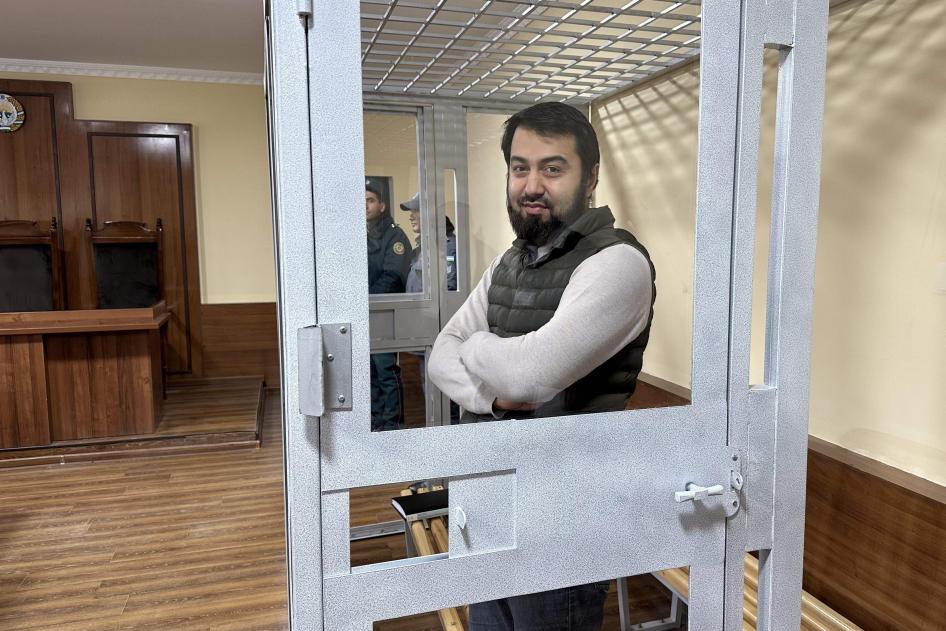(Berlin, December 5, 2023) – A criminal court in Uzbekistan sentenced a blogger from the Ferghana region to eight years in prison and ordered his social media accounts and channels blocked on December 1, 2023, for “insulting” and “slandering” public officials and for dubious financial offenses, Human Rights Watch said today.
The authorities had detained the blogger, Olimjon Khaidarov, 34, on July 29, as he was allegedly in the act of extorting money from the head of the central bazaar in Kokand, a city southeast of Tashkent. The other charges were added later. He denies any wrongdoing and contends that he was victim of a setup in retaliation for his critical reporting.
“The court decision to jail Khaidarov for eight years, including on freedom of expression offenses, will have a chilling effect on free speech and media freedoms in Uzbekistan,” said Mihra Rittmann, senior Central Asia researcher at Human Rights Watch. “Despite initial improvements, respect for freedom of speech and media freedoms has taken a negative turn and these rights are increasingly coming under attack in President Shavkat Mirziyoyev’s ‘New Uzbekistan.’”
Khaidarov, who has nearly 30,000 followers on his YouTube channel, has become well-known locally for his reports criticizing local authorities and for raising concerns related to alleged corruption and free speech. Khaidarov’s conviction is the latest in a string of criminal cases brought against bloggers and journalists in Uzbekistan, some of whom were known for challenging local authorities and raising socio-economic issues.
Ferghana region police claim they caught Khaidarov in the act of extorting US$2,500, allegedly the final tranche of a US$10,000 total, from the head of Kokand Istiklal bazaar in exchange for not posting “articles with negative content” about the market. On July 29, a Kokand court ordered Khaidarov placed in pre-trial detention.
The October 10 indictment, a copy of which Human Rights Watch has on file, includes charges of slander and insult, as well as “large-scale extortion.” The Kokand city mayor claimed that Khaidarov slandered him in a post about the off-the-books sales of parking spaces in Kokand. A deputy head of the district police claimed Khaidarov insulted him by cursing him and calling him a “bastard.”
Insult and slander are criminalized in Uzbekistan, in violation of international human rights standards, despite the president’s promises in 2020 to decriminalize both offenses.
Laws that allow imprisonment over peaceful criticism or insults of individuals or government officials are incompatible with Uzbekistan’s international obligations to protect freedom of expression, Human Rights Watch said.
The prosecution of Khaidarov comes amid an increasingly hostile environment for media workers in Uzbekistan. In March, approximately 40 journalists and bloggers signed an open appeal to President Mirziyoyev raising concerns about censorship, pressure, and intimidation. A number of bloggers and independent journalists have announced during 2023 that they will cease their work, citing pressure.
On November 22, Ilyos Safarov, a journalist who reported on wide-ranging issues for Kun.uz, a local media outlet, announced his departure from the agency. In an interview with Radio Ozodlik, Safarov said that “journalism is entering a very difficult and complex period” in Uzbekistan.
Khaidarov joins several other bloggers and journalists in prison in Uzbekistan, including the blogger Otabek Sattoriy, who in May 2021 was sentenced to six-and-a-half years in prison on dubious slander and extortion charges. The United Nations Working Group on Arbitrary Detention issued a decision in November 2022 finding Sattoriy’s deprivation of liberty arbitrary and calling for his immediate unconditional release and reparations.
The Uzbek government should cease targeting bloggers and journalists with spurious prosecutions and ensure that they can carry out their work without undue interference, or fear of retaliation or politically motivated prosecution, Human Rights Watch said.
“Khaidarov is the latest casualty in the Uzbek government’s crackdown on critical and independent reporting,” Rittmann said. “Prosecutions for alleged defamation, or imprisoning bloggers and journalists on other dubious charges, are practices wholly inconsistent with Uzbekistan’s stated reform agenda and its international human rights obligations.”







